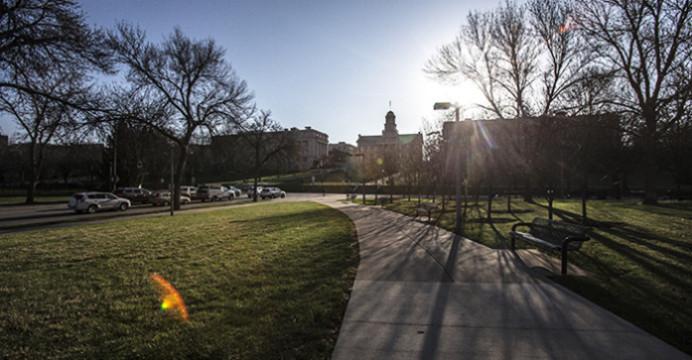By Zach Weigel
Tuition will go up for all University of Iowa students this coming academic year, but by just how much remains uncertain.
In December, the state Board of Regents approved a $200 tuition increase for resident undergraduates and a $502 increase for nonresident undergrads to take effect at the start of the fall semester.
For graduate students, the tuition increases will be slightly less, at $160 for residents and $486 for nonresidents.
The regents’ initial plan for the tuition hike was to have it take effect in the spring semester, but UI officials have credited successful lobbying by former UISG President Liz Mills as instrumental in delaying the increase.
Nevertheless, Regent Communications Director Josh Lehman said a shortfall in state appropriations prompted the regents to encourage all three regent schools — the UI, Iowa State, and the University of Northern Iowa — to explore further tuition increases.
According to documentation obtained from the regents, state budget constraints permitted only $6.3 million in new funding to be allocated to the regents’ schools despite a request for $21.34 million. Specifically, the UI received only $1.3 million of its $4.5 million request.
Lehman said to augment the deficit, the UI proposed an additional $300 tuition increase for all resident students and a $400 tuition increase for all nonresident students at the regents’ June meeting.
“All tuition items go through a two-step process,” Lehman said, meaning that the regents have yet to decide on the proposed additional tuition increases.
On July 12, the official meeting docket will be released, and a vote on July 18 could approve the tuition proposal.
Altogether, if the UI proposal is approved, regent documents show that resident undergraduates will see a total increase of $500 beginning in the fall semester with nonresidents seeing a $902 increase in their tuition.
Graduate resident students would see a $460 increase, and nonresident grad students would have an $886 increase.
To boot, some students could face even steeper tuition increases as part of a supplemental tuition plan.
In this supplemental proposal to the regents, students in the Tippie College of Business and in the College of Engineering could see a tuition increase of anywhere from $500 to $800, depending on class standing and residency status.
The $500-$800 tuition proposal for engineering and business students would be implemented in lieu of the proposed additional $300 and $400 increases for all students.
If approved, this would equate to business and engineering majors having a total tuition increase of $700 to $1,000 for resident undergrads and $1,002 to $1,302 for nonresident undergrads.
For nearly a decade, tuition has been higher for business and engineering students, but business Dean Sarah Gardial said it has been five years since there has been increased tuition in the school.
“Due to dramatic increases in enrollment, we need to raise tuition to target undergraduate support for student success,” she said. “We realize raising tuition places a burden on the students … so we’ve been raising scholarship money like crazy.”
Still, some UI students, such as senior finance major Zach Kozlowski, expressed trepidation.
“I’m not happy about the tuition increase because it’s already pretty expensive,” he said.
With diversity being a major initiative for the UI, Nic Arp, the College of Liberal Arts & Sciences director of strategic communications, said he believes the university will continue to extend opportunities to low-income and diverse students.
“Tuition might go up, but we don’t see that precluding access,” Arp said.
UI officials say the school has the second lowest undergraduate tuition in the Big Ten, roughly $3,500 less than the average school.
Arp said the key is keeping college affordable yet making sure the UI has resources on par with peer institutions.
“What it boils down to is we have to keep pace with inflation while balancing affordability,” he said. “… [It’s] only a bargain if we can continue to provide high-quality education.”







